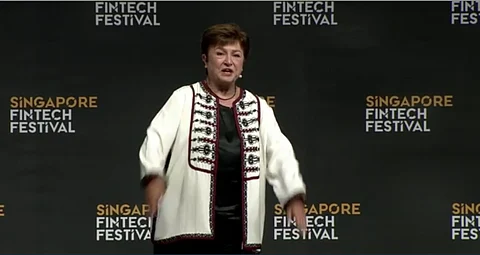

The managing director for the International Monetary Fund urged international private and public cooperation to make central bank digital currencies (CBDC) a reality.
In a speech to the Singapore Fintech Festival (SFF), Kristalina Georgieva recalled a speech made at the 2018 SFF gathering by her predecessor, Christine Lagarde.
“Five years on, I’m here to provide an update on that voyage. First, countries did set sail. Many are investigating CBDCs and are developing regulation to guide digital money developments. Second, we have not yet reached land,” she said.
“Third, this is not the time to turn back. The public sector should keep preparing to deploy CBDCs and related payment platforms in the future. Fourth, these platforms should be designed from the start to facilitate cross-border payments, including with CBDCs.”
Georgieva told the 75,000 conference attendees digital currency development was now on “the high seas. This calls for courage and determination…If anything, we need to raise another sail to pick up speed.”
She pointed out how ChatGPT took only two months to get 100 million users, when it took three years for other big platforms to grow that big.
“Adoption of CBDCs is nowhere close. But about 60% of countries are exploring them in some form today. CBDCs can replace cash which is costly to distribute in island economies. They can offer resilience in more advanced economies. And they can improve financial inclusion where few hold bank accounts,” she boasted.
“How many other countries will adopt CBDCs? To what extent will cash become obsolete?”
Georgieva promised “CBDCs would offer a safe and low-cost alternative” and function “just like cash today which we can withdraw from our banks.” But, the idea would take some selling.
“Country authorities wishing to introduce CBDCs may need to think a little more like entrepreneurs. Communication strategies and incentives for distribution, integration and adoption are as important as design considerations,” she said.
The task ahead was “onboarding merchants so they accept CBDCs” and integrate them “into financial services and messaging apps so people can pay each other from any environment.”
Georgieva said AI “could amplify some of the benefits of CBDCs” and “improve financial inclusion by providing rapid, accurate credit scoring based on various data.”
Still, she emphasized the need to “protect personal privacy and data security, and avoid embedded biases so we don’t perpetuate inequality but aim to reduce it.”
The Bulgarian economist, who has managed the IMF since 2019, said “countries should continue exploring CBDCs” and to help, the IMF was launching a CBDC Handbook “to collect and share knowledge on CBDCs for policymakers around the world — to help them to sail ahead"
“We must start this work today so we don’t have to backpedal tomorrow.”
Efficient cross-border payment systems were needed to reach “Sustainable Development Goal targets, she said. And a “G20 Roadmap to enhance cross-border payments” was already underway.
“In fact, I’m happy to announce that the IMF and World Bank will soon publish a common plan to provide capacity development to countries in just this area,” she said.
“The public sector is also pushing the frontier, including with the help of the BIS [Bank of International Settlements] Innovation Hub. The Monetary Authority of Singapore is particularly active. Its project Guardian explores platforms to exchange digital money and assets. IMF staff will participate in project Guardian.”
The effort would fall short without government participation, Georgieva suggested.
“[T]he public sector needs to offer a little more guidance…to act as a catalyst, to ensure safety and efficiency — and to counter fragmentation,” she said.
“What we need in this voyage is a compass…no one institution can provide such guidance. We will have to collaborate tightly across international institutions, central banks and ministries of finance. The IMF can and will play its part.”
Georgieva promised listeners CBDC development would remain “in the high seas for some time” but “a more inclusive international financial system that meets our future needs” would be rewarding.
“So let us not disembark at the first island. Nor turn back,” she urged attendees.
“As Marcel Proust once said, ‘The real voyage of discovery consists not in seeking new landscapes, but in having new eyes.’”
